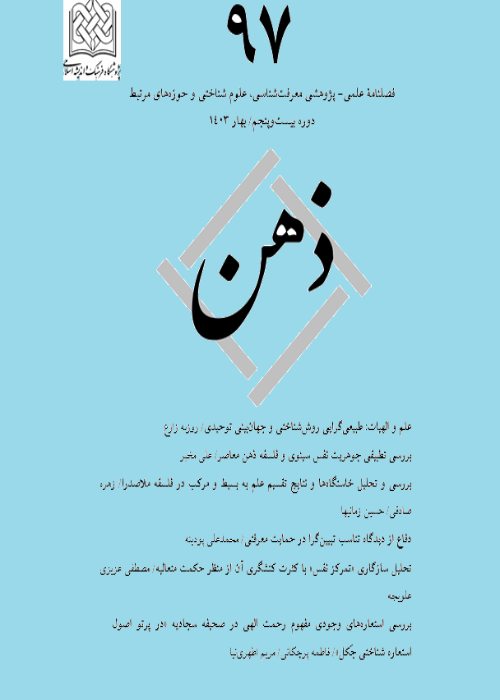The Logic of Theoretical mysticism
Author(s):
Abstract:
This paper is an initial attempt to lay the foundations for what may be termed as the logic of theoretical ʿirfān. Since theoretical mysticism is based on descriptions of mystical witnessing — which is liable to be mistakenly interpreted in the process of describing the experience itself — there is a need to identify framework by which the validity of these experiences can be tested. What are the criterion upon which this framework can be based? The proposed framework is based on two criterion. The first is the criterion of religion and the second, the criterion of the intellect. Both of these criterion have two measures; foundational and not foundational. The foundational measures are those which are necessary, real and certain and their attestation is absolute. The measures which are not foundational are limited, graded in their attainment and theoretical and so they are conditionally attested. The criterion of religion is organised according to what is present in the Qurʾān and the aḥādīth reports which together form a criterion against which the descriptive accounts of mystical experience can be tested. Those accounts have two types of implication; real implications and certain implications. The first type of implication has foundational measures and the second type has advanced measures.The foundational measures result in definitive reasons (iḥtijājāt) and the advanced measures result in conditional reasons (tanjīzāt). The iḥtijājāt are implications in which what is implied is testified by the intellect in a manner that all of its foundations are accepted unconditionally and with certainty. Tanjīzāt, on the other hand, are implications where what is implied is testified by the intellect with a more general certainty that may not be acted against. If someone acts against this type of certainty they are not pardonable (maʿdhūr), rather what is implied can also be unconditionally ratified. The criterion of the intellect applies to universal, theoretical sceince (dānesh-i kullī naẓarī). By using intellectual principles and intellectual methods of derivation intellectual questions are answered through the frameworks of logic and philosophy. The criterion of the intellect is the framework for all universal and particular statements. These statements specific to the intellect can be categorised with the categorisation of the intellect into the general intellect and the specific intellect. Using this criterion necessary statements (ḍurūrīyāt), the general principles (usūl-i ʿāmma), pre-experience (pīshātajribī), prederivation (pīshāistidlālī) and what is essentially ratified (ḍurūrīyat-i ṣidq) are the foundation, whereas theories (naẓariyāt), uncommon principles (uṣūl ghayrhamgānī) and uncommon derivation are advanced measures.
Keywords:
Language:
Persian
Published:
Journal of Zehn, Volume:19 Issue: 2, 2018
Pages:
73 to 115
magiran.com/p1895104
دانلود و مطالعه متن این مقاله با یکی از روشهای زیر امکان پذیر است:
اشتراک شخصی
با عضویت و پرداخت آنلاین حق اشتراک یکساله به مبلغ 1,390,000ريال میتوانید 70 عنوان مطلب دانلود کنید!
اشتراک سازمانی
به کتابخانه دانشگاه یا محل کار خود پیشنهاد کنید تا اشتراک سازمانی این پایگاه را برای دسترسی نامحدود همه کاربران به متن مطالب تهیه نمایند!
توجه!
- حق عضویت دریافتی صرف حمایت از نشریات عضو و نگهداری، تکمیل و توسعه مگیران میشود.
- پرداخت حق اشتراک و دانلود مقالات اجازه بازنشر آن در سایر رسانههای چاپی و دیجیتال را به کاربر نمیدهد.
In order to view content subscription is required
Personal subscription
Subscribe magiran.com for 70 € euros via PayPal and download 70 articles during a year.
Organization subscription
Please contact us to subscribe your university or library for unlimited access!



